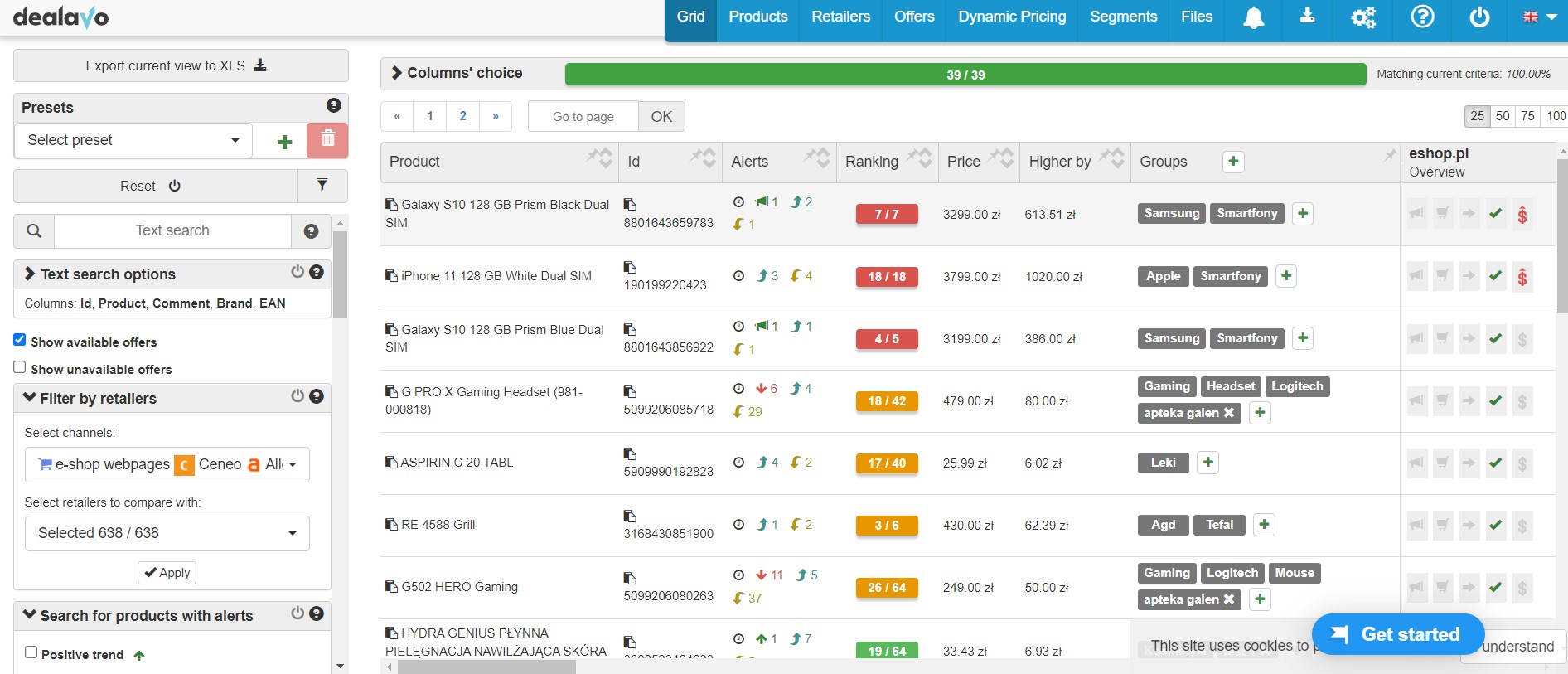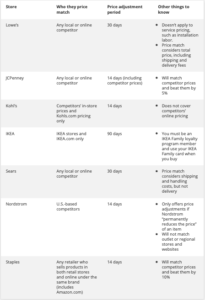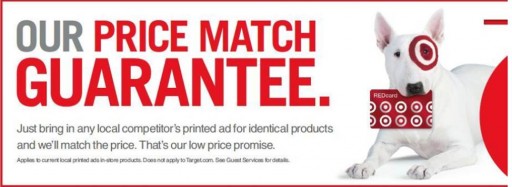What is Price Matching and How Does It Work?
- 12 October 2022
Customers rely heavily on e-commerce marketplaces and sites that allow them to purchase products at the bottom price. A product’s reasonable price is not enough these days as potential buyers will actually look for cheaper substitutes. That’s the point where the strategy of price matching makes a huge difference for online retailers.
But what exactly is Price Matching?
Price Matching is a common strategy of matching your products’ prices with the prices of your competitors’ substitutes. This method is often used by e-stores and retailers trying their best to stay competitive and satisfy their customers.
Price match often means equalizing the price and giving a price difference refund for customers who found the same item at a lower price. It can be provided by an efficient price monitoring tool such as Dealavo.

In Dealavo you can match your prices to market prices. Use it and set up a demo.
Types of Price Matching
Price Matching was originally used mainly by big supermarkets like Walmart, Best Buy or Tesco, but over time it turned out that the strategy itself works wonders also for e-commerce shops and retailers.
Okay, but if it fits such a wide variety of businesses, how is it so effective? That’s a good question that can be answered with a number of different price-matching strategies. Different types will match different companies and bring what’s best for them through price sensitivity tactics.
There are lots of price matching strategies, but we will focus on the four of them that are used the most and show the best effectiveness:
-
Standard Price Matching
Setting a product’s price accordingly to a competitor’s substitute price
-
Presale Price Matching
A Pricing Policy stating that if one finds a cheaper product’s substitute elsewhere, the product’s price will be lowered to match it.
-
Post-sale Price Matching
A Pricing Policy stating that clients have some time after the purchase (48 hours, one week, two weeks) to get the difference refund. EBay is one of the biggest platforms using this price match strategy.
-
Price Beating
Pricing products lower than your competitors as soon as they change, even before customers notice it
Below you can see a list of popular stores, the way they price match and their price adjustments periods:

The image source: https://www.creditcards.com/education/store-price-matching/
Note: You need to remember that price-matching strategies will be nowhere near as effective as they are for online shops and retailers.
Pros And Cons of Price Matching
As with everything, Price Matching has its’ strengths and weaknesses. Let’s take a closer look at both sides of the strategy so that you can decide whether it’s the right strategy to follow in your business.
Pros
Price matching is something that customers really like in terms of their financial decisions. If they see that a company tries to serve them with the lowest price, they often appreciate it and stay loyal. Below we listed 3 main pros of Price Matching. Let’s take a look.
Increased Customer Confidence
As stated before, a price match strategy may lead to a boost in your customers’ confidence and loyalty. Customers are really demanding nowadays, and every company that cares about them will surely stand out from the competition even the most demanding ones.
For many customers, a company that uses price matching is honest, has a good reputation and follows a fair pricing policy.
Once your buyers will identify your prices as higher and not so attractive, there’s a big chance that their loyalty will decrease, such as your revenue.
Increased Sales
Growth in sales is one of the most popular price-matching strategy outcomes. If you opt to boost your sales and generate higher ROIs, you should implement the price match policy to achieve it.
Shoppers will always prefer a shop with lower prices (if the items are exactly the same). That’s why, in order to keep your sales high, you need to do everything to match your competitor’s prices or (if possible) beat them.
Higher Success Rate
Price Matching provides businesses with a higher success rate as they stay competitive across the market and may easily outrun bigger competitors. The strategy increases brand loyalty and customer content, therefore it’s a key feature in one’s success.
Cons
Price Matching has many benefits, but it also has some downsides. These factors are exactly why the biggest marketplace on Earth – Amazon uses aggressive repricing instead of it.
Risk of Price Wars
Probably the biggest “con” is the Price Wars aspect. More and more research shows that price match policy may lead to large price wars between competitors. Price Wars occur when two or more companies try to set the best price for a given product by continuously lowering its price. That way the price gets extremely low, and companies don’t profit from their product.
It’s obvious that Price Wars are something that every company wants to avoid in order to keep the margins high and the market situation stable.
Probability of Losing Your Customers
Another disadvantage of the Price Match Strategy is the risk of losing g your customers.
You may ask where is the risk of it in the strategy itself. And it’s a good question. Look, if your customers get used to this strategy and its benefits, they will continue to ask you for refunds and so on. What if there’s a situation in which you may no longer give them refunds on a given product? Counting on their implicit loyalty may be disappointing as they may as well head to your competition.
Moreover, if your company is small, the strategy may not work at all and on top of that, you may risk losing your customers (which you don’t have many anyway).
Margin Degradation
Margin is one of the most crucial factors in any business. That’s why you have to protect it at all costs. A price match strategy may lead to the degradation of the margin whenever you lower your prices. It decreases your profitability and negatively affects your overall financial situation.
As we mentioned before: Don’t compare too much! If margin degradation is not a thing for some retailers, it doesn’t mean it cannot affect badly your business.
Price Matching Examples
The strategy is just made for large companies. That’s why so many of them implemented it as soon as they started growing. In this section, we will go through examples of companies using the Price Match Strategy.
Target

The image source: https://www.theodysseyonline.com/15-reasons-why-target-always-gets-the-best-of-me
One of the biggest US general merchandise retailers offers a very generous price matching to their clients. They provide offline and online price match refunds for over 25 competitors including Amazon and Sears.
What’s more, Target offers both pre-sale and post-sale refunds (within the 14-day period for post-sale items).
Walmart

The image source: https://retailwire.com/discussion/walmart-to-end-price-matching-in-some-stores-but-not-really/
Walmart is without a doubt one of the most popular and biggest retailers. They offer offline and online price matching, but it’s not as generous as Target’s offer.
Customers who shop at Walmart are provided with easy refunds, but the number of stores to which the rule applies is limited. That’s a good example of another giant retailer that takes customer satisfaction seriously and grows its revenue alongside.
Media Markt

The image source: https://womiraz.com/mediamarkt-is-launching-a-huge-gaming-sale-for-gamescom-2022/
Based in Germany, Mediamarkt is one of the world’s largest consumer electronics retailers.
Europe’s largest consumer electronics shop provides its customers with Price Matching whenever they find a cheaper product. As for now, it works both for pre-sale and post-sale purchases.
Summary
Price Matching is a key feature when it comes to e-commerce stores. It’s extremely efficient for bigger stores, but some of the strategy’s premises might also work for smaller businesses.
Accurate price match is a very demanding task that should be handed over to a price monitoring solution such as Dealavo. Alongside precise repricing and reports, this kind of software can work wonders for any type of e-commerce store.